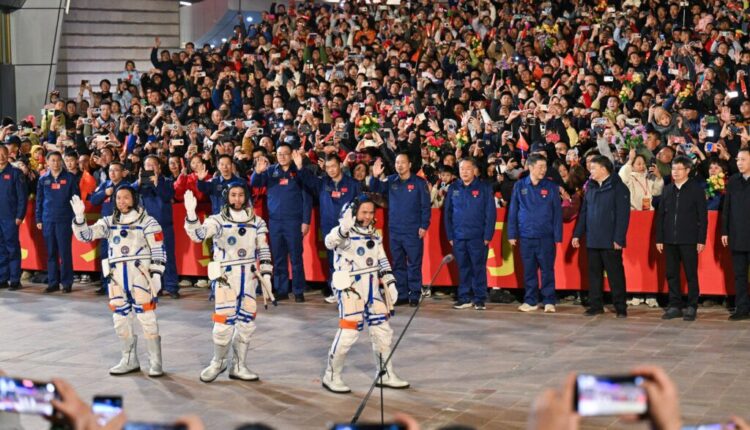China launches youngest astronaut and lab mice to Tiangong space station
China has launched its youngest astronaut ever, alongside four laboratory mice, to the Tiangong space station in a landmark mission aimed at advancing space research and biological experimentation.
According to Xinhua News Agency, the Shenzhou-21 spacecraft successfully docked with the Tiangong space station at 3:35 a.m. on Saturday, November 1 (1935 GMT Friday, October 31), nearly four hours after blasting off from the Jiuquan Satellite Launch Center in northwest China aboard a Long March-2F rocket.
The mission’s three-member crew includes Commander Zhang Lu, a veteran astronaut; flight engineer Wu Fei, 32, China’s youngest-ever astronaut; and payload specialist Zhang Hongzhang, 39. Before liftoff, the trio waved goodbye to their families and colleagues at the Gobi Desert launch base as a military band played a patriotic anthem.
Commander Zhang Lu pledged to “report back to our motherland and its people with complete success,” while first-time astronaut Wu Fei described the mission as a “dream come true.”
The spacecraft also carries four mice — two male and two female — for China’s first in-orbit biological experiment involving rodents. Scientists hope the research will shed light on how long-term exposure to space conditions affects mammalian physiology.
China’s Tiangong space station, which hosts rotating three-person crews every six months, stands as the centrepiece of Beijing’s ambitious and fast-growing space programme. The country aims to send astronauts to the Moon before 2030 and eventually establish a lunar base — a key part of President Xi Jinping’s vision of achieving China’s “space dream.”
In addition to conducting scientific research, the Shenzhou-21 crew will perform spacewalks and install anti-debris shields to protect Tiangong from space junk. The mission also includes an educational component designed to inspire young people and promote international collaboration in space exploration.
China, which became the third country to send humans into orbit after the United States and the Soviet Union, has made major advances in recent years. Notable achievements include the Chang’e-4 probe’s historic landing on the far side of the Moon in 2019 and the deployment of a Mars rover in 2021.
Barred from the International Space Station (ISS) since 2011 due to U.S. restrictions on NASA’s cooperation with China, Beijing has pursued its own partnerships — including a 2025 agreement with Pakistan to train and send the first foreign “taikonauts.”
The China Manned Space Agency (CMSA) said the ongoing mission marks another significant step toward its long-term goal of sending astronauts to the Moon and strengthening its position as a global space power.


